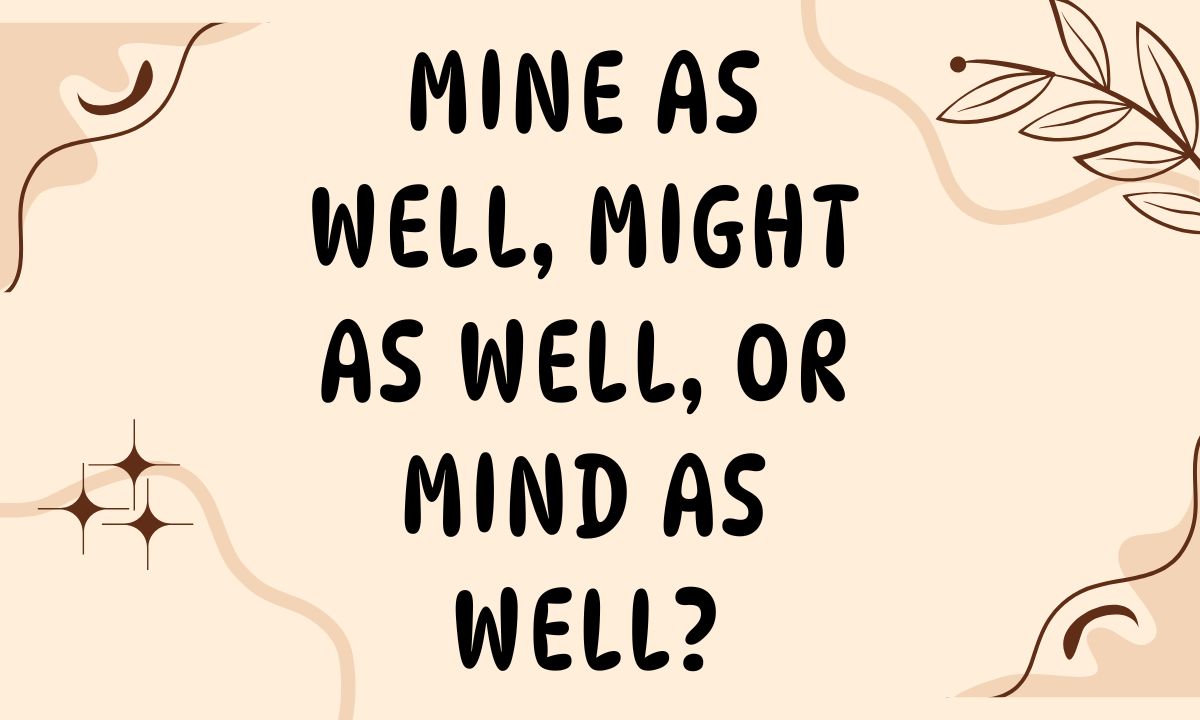Confused about when to use “Mine as well” or “Might as well”? You’re not alone. Many English learners and even native speakers mix these phrases up because they sound similar but have very different meanings.
Understanding the difference can help you speak and write more clearly. In this article, we will break down the correct usage of “Mine as well” and “Might as well”, explain common mistakes, and give practical examples so you’ll never mix them up again. By the end, you’ll know exactly which phrase fits each situation.
Which Is Correct?
Confused about whether to use “Mine as well”, “Might as well”, or “Mind as well”? You’re not alone. These phrases sound similar but have very different meanings and uses in English. Mixing them up can make your sentences awkward or even confusing.
In this article, we will break down the correct usage of “Mine as well” and “Might as well”, explain why “Mind as well” is rarely correct, and provide plenty of examples to help you use them naturally in conversation and writing.
Understanding the Difference Between “Mine as Well” and “Might as Well”
The confusion usually comes from the similar sound of these phrases, but their meanings are distinct.
- Mine as well: This is rarely used in modern English and can sound awkward. It literally means “belongs to me too” or “also mine.”
- Might as well: This is the phrase you’ll use most often. It is used to suggest a course of action, usually when there’s no better option or when something is convenient.
- Mind as well: Often a mishearing of “Might as well.” Saying “mind as well” is generally incorrect in this context, although “mind” can appear in other phrases like “mind as well do this” (which is still informal and less common).
In short, if you want to suggest doing something because it seems reasonable or inevitable, “might as well” is almost always correct.
What Does “Might as Well” Mean?
“Might as well” is a versatile phrase in English. It expresses:
- A reasonable suggestion: When you see no better option.
- Acceptance of a situation: When something is inevitable.
- Mild resignation: When you do something because it’s convenient or there’s nothing to lose.
Examples:
- It’s raining, so we might as well stay home.
- Since no one is using the car, we might as well take it to the store.
- We’re already at the restaurant, so we might as well order dessert.
Notice how in all these examples, “might as well” suggests a choice that is logical, convenient, or unavoidable.
How “Mine as Well” Is Used
“Mine as well” is not as common and is mostly used in informal speech to indicate ownership or similarity. It’s generally used to emphasize that something belongs to you or should belong to you too.
Examples:
- If she’s taking the last cookie, it’s mine as well.
- He has two tickets, so mine as well can come along.
In modern English, it’s often clearer to just say “mine too” instead of “mine as well.”
Common Mistakes With “Mind as Well”
Many people accidentally write or say “mind as well” when they mean “might as well.” This is a common spelling mistake because the words sound very similar.
Incorrect Examples:
- We mind as well start the meeting now. (❌)
- You mind as well try the new restaurant. (❌)
Corrected Examples:
- We might as well start the meeting now. (✅)
- You might as well try the new restaurant. (✅)
Remember: if you’re suggesting a logical or convenient action, always use “might as well.”
Tips to Remember the Difference
Here are some quick tips to help you use these phrases correctly:
- Think about ownership: If you are talking about something that belongs to you, use “mine as well.”
- Think about action or choice: If you are suggesting an action because it’s reasonable or convenient, use “might as well.”
- Avoid “mind as well” unless it’s part of a very informal or idiomatic expression. Most of the time, it’s a mistake.
A simple memory trick:
- Might = action → Might as well do it.
- Mine = possession → This cookie is mine as well.
Side-by-Side Comparison
| Phrase | Meaning | Example |
| Might as well | Suggesting a logical action | We might as well leave now. |
| Mine as well | Indicating ownership or similarity | If he has one, mine as well should come. |
| Mind as well | Usually incorrect in this context | We mind as well leave now. ❌ |
This table makes it clear why “might as well” is the most common phrase in everyday English.
Everyday Usage of “Might as Well”
Here are some real-life situations where “might as well” fits perfectly:
- During errands:
- We’re already at the mall, so we might as well buy groceries too.
- We’re already at the mall, so we might as well buy groceries too.
- When something is unavoidable:
- The store is closing soon; we might as well pick up what we need now.
- The store is closing soon; we might as well pick up what we need now.
- With mild resignation:
- The movie tickets are sold out, so we might as well watch something else.
- The movie tickets are sold out, so we might as well watch something else.
Using “might as well” makes your English sound natural and conversational.
Common Phrases With “Might as Well”
“Might as well” often appears with other words for more nuance:
- Might as well be – suggesting something is essentially equivalent:
- Without my keys, I might as well be locked out.
- Without my keys, I might as well be locked out.
- Might as well go – suggesting action:
- Since everyone’s leaving, we might as well go too.
- Since everyone’s leaving, we might as well go too.
These variations are widely used in both spoken and written English.
Why People Confuse These Phrases
The confusion comes from:
- Pronunciation – “mine,” “might,” and “mind” sound similar, especially in fast speech.
- Informal writing – people often type what they hear without checking the spelling.
- Lack of clarity – learners often know the phrases exist but are unsure when to use each.
A good tip is to always think: Am I talking about ownership or suggesting an action? This will guide you to the correct phrase.
Quick Practice Examples
Fill in the blanks with might as well or mine as well:
- There’s nothing to eat at home, so we _______ order pizza. ✅
- If she’s taking the last pen, it’s _______ for me too. ✅
- Everyone is leaving early, so we _______ leave now. ✅
- He brought one chocolate bar, and I want one _______. ✅
Answers: 1 – might as well, 2 – mine as well, 3 – might as well, 4 – mine as well
Practicing these examples will help you internalize the correct usage.
Conclusion
In English, the phrases “Mine as well” and “Might as well” serve very different purposes. “Might as well” is by far the most common, used to suggest logical, convenient, or inevitable actions. “Mine as well” is less common and mostly indicates ownership. Avoid using “mind as well” in this context because it’s usually incorrect.
By understanding the differences, practicing examples, and remembering the quick tips we discussed, you can confidently choose the correct phrase every time. Next time someone says, “We start now,” you’ll know the answer is clearly “might as well.”
Frequently Asked Questions
What is the difference between “Mine as Well” and “Might as Well”?
“Mine as Well” indicates ownership or that something belongs to you, while “Might as Well” is used to suggest a logical or convenient action when there is no better alternative.
Can I use “Mind as Well” instead of “Might as Well”?
No, “Mind as Well” is usually incorrect in this context. The correct phrase for suggesting an action is “Might as Well.”
Is “Mine as Well” commonly used in modern English?
Not really. “Mine as Well” is less common and often replaced with simpler phrases like “mine too” in everyday conversation.
How do I know when to use “Might as Well”?
Use “Might as Well” when you want to suggest an action that is reasonable, convenient, or inevitable, such as “It’s raining, so we might as well stay home.”
Can “Might as Well” be used in formal writing?
Yes, but it’s generally more common in conversational or informal writing. In formal writing, you might replace it with phrases like “it is reasonable to” or “it would be appropriate to.”
Are there common phrases that include “Might as Well”?
Yes, common variations include “Might as Well Be” (meaning essentially the same as) and “Might as Well Go” (suggesting action), e.g., “Without my keys, I might as well be locked out.”
How can I remember the difference between these phrases?
A simple trick: if you are talking about ownership, use “Mine as Well.” If you are suggesting an action, use “Might as Well.” Avoid “Mind as Well” in most cases.








